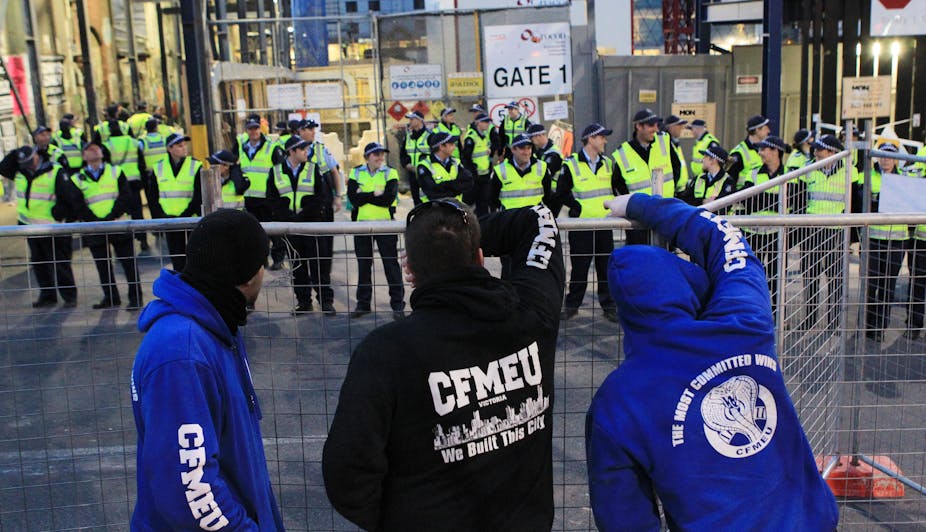The Abbott Government is this year preparing to revive the Australian Building and Construction Commission (ABCC) after it was renamed and stripped of many of its powers by the Gillard Government in 2012.
Two bills propose a new ABCC with significantly more coercive powers than its Howard-era predecessor. These powers infringe a cluster of civil rights and, as University of Sydney law professor Ron McCallum suggests, are “similar to aspects of the terrorism laws”.
The main differences between the old and new ABCC are that the “Improving Productivity” Bill provides a revived ABCC inspectorate and commission with new powers of coercive investigation, extended jurisdiction and increased maximum penalties. The “Transitional” Bill gives the ABCC retrospective prosecutorial power.
No right to silence
The new investigative powers mean any person may be compulsorily required to provide information in relation to a suspected contravention of the Bill or a building law. Failure to comply is punishable by up to six months imprisonment. Accordingly, the proposed laws dispense with “the right to silence” and render legal representation a mere nicety. University of Adelaide law professor Andrew Stewart claims that such powers are “extraordinary” and, “analogous to those of ASIO”.
The measures extend the jurisdiction of the ABCC beyond the construction industry. The ABCC will be empowered to surveil and prosecute workers and unions in the transport, warehousing and manufacturing industries.
Maximum penalties for unlawful industrial action, and unlawful picketing will increase. Current maximum penalties for unlawful industrial action stand at 30 penalty units for individuals and 60 penalty units for a body corporate or industrial organisation (A$5,100 and A$10,200 respectively).
Increased penalties
Under the new Bill, the ABCC will be empowered to impose a maximum penalty of 200 penalty units for individuals and 1000 penalty units for bodies corporate (A$34,000 and A$170,000 respectively). These fines are analogous to penalties for serious criminal offences such as people smuggling and loitering by sex offenders, commonly associated with terms of imprisonment of up to seven years.
Retrospective powers of prosecution will allow the ABCC to investigate and punish industrial infractions predating the enactment of the new laws.
According to the UN’s International Labour Organisation, the previous ABCC was in serious breach of three key international labour law conventions. The current Bills will restore this system of rules.
The new laws will significantly impede workers in the construction and allied industries from exercising a raft of civil rights derived from international law. The freedom of association, the right to peaceful assembly, the right to freedom of expression, the right to strike and the prohibition against retrospective criminal prosecution, will all be downsized.
Productivity myth
The government claims the operation of the previous ABCC corresponded with a 9% increase in productivity in the construction industry. It relies on the findings of a 2007 report conducted by private consulting firm, EconTech.
However, in the, “Transition to Fair Work Australia for the Building and Construction Industry – Final Report” the Hon. Murray Wilcox QC found EconTech uses a form of economic modelling that is “deeply flawed”, and, “ought to be totally disregarded”.
Rather, as Griffith University employment relations professor David Peetz has shown using standard economic modelling based on ABS National Accounts data, during the existence of the ABCC, productivity in the construction industry grew at a lower rate than standard growth in other major industries.
Currently, industrial disputation in the construction industry sits at one of the lowest levels recorded over the past 25 years. The return of the ABCC is not about increasing productivity.
These new powers are not necessary to enforce the law. The existing Fair Work (Building Industry) Act 2012 already prohibits a range of industrial disputation practices such as coercion and adverse action. As Wilcox found, “there is nothing…that needs to be carried forward into the new legislation”, in effect finding the ABCC redundant in light of the Fair Work Act.
If not for the sake of productivity and law enforcement, what is the purpose of resuscitating the ABCC and equipping it with an arsenal of draconian new powers?
Like the Masters and Servants Acts and Combination Acts of the nineteenth century, these laws seek to criminalise organised labour and prosecute infractions of labour discipline. Unlike the labour law of this bygone era, however, the current measures have no basis in political economy. They are purely punitive – a thuggish shot across the post-electoral bows to show the union movement “who’s boss”.
The revival of the ABCC is an ideological manoeuvre designed to intimidate and prosecute the Construction Forestry Mining and Energy Union (CFMEU) and anyone who supports them. Meanwhile, there is little evidence to support the Bills’ stated aim of improving productivity within the construction industry.

